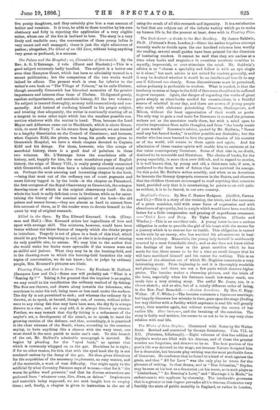The Palate and the Hospital ; or, Chronicles of Greenwich.
By the Rev. A. G. L'Estrange. 2 vols. (Herat and Blackett.)—This is a good subject extremely badly handled. The subject is a better one even than Hampton Court, which has been so admirably treated in a recent publication; but the comparison of the two works would indeed be odious. The present work is even far inferior to the writer's own book on "The Village of Palaces," as he calls Chelsea, though assuredly Greenwich has historical memories of far greater importance and interest than those of Chelsea. Ill-digested gossip, random antiquarianism, and anecdotic history, fill the two volumes. No subject is treated thoroughly, no story told consecutively and con- nectedly. And instead of confining himself to his proper subject, and treating that adequately, the writer is continually starting off at a tangent to some other topic which has the smallest possible con- nection whatever with the matter in hand. Thus, because the Lord Mayor and Aldermen came out to Blackheath, which is above Green- wich, to meet Henry V. on his return from Agincourt, we are treated to a lengthy dissertation on the Council of Constance; and because, when Captain Kidd, the pirate, was hung, his goods were given to Greenwich Hospital, we have a whole chapter devoted to Captain Kidd and his doings. For those, however, who like scraps of anecdotal history, there is a good deal of pabulum in these two volumes. Mr. L'Estrange loves the scandalous side of history, and, happily for him, the most scandalous page of English history, the reign of Henry VIII., is really pretty closely connected with Greenwich, and we then have a tolerably connected story told us. Perhaps the most amusing and interesting chapter in the book, —being that most out of the ordinary ran of court pageants and court history lugged in by the heels—is the chapter on Flamateed, the first occupant of the Royal Observatory at Greenwich, the octagon drawing-room of which is the original observatory itself. On the whole the book is sadly deficient even in liveliness, while as for ascer- taining the history of the nominal subjects of the book—the old palace and manor-house,—they are almost as hard to extract from this account of them, as if the reader were to devote himself to the quest by way of original research.




































 Previous page
Previous page